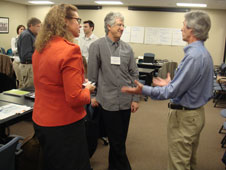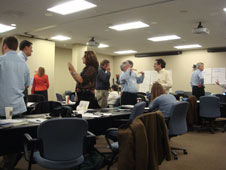May 28, 2010 Vol. 3, Issue 5
The Academy’s second Knowledge Forum addressed how organizations acquire and transfer the knowledge they need to staff successful projects.
The Academy convened a global group of knowledge experts from government, academia, and industry to share insights and stories about knowledge sharing during the Academy’s second Knowledge Forum, which was hosted by MITRE on Thursday, April 22, 2010 in San Diego, California.

From left to right: Jo Spencer, Director of Communications and Partner Relations for the International Center for Complex Project Management; Paul Adler, professor at the Marshal School of Business at the University of Southern California; and Ed Rogers, Chief Knowledge Officer at Goddard Space Flight Center. Credit: NASA APPEL
The forum opened with a discussion led by Paul Adler, professor at the Marshall School of Business at the University of Southern California, about defining communities to better understand the ways in which project organizations can continue to thrive and innovate. Participants agreed that communities share a vision, purpose, or identity in addition to a common language, commitment, and information. Some communities are traditional (e.g. religious), while others are more innovative (e.g., scientific).
“Traditional forms of communities are antithetical to innovation,” said Adler. “There is a very distinct type of community that encourages innovation.” Adler emphasized that traditional communities have their place, but “if you want an organization in which innovation is a crucial performance outcome, you need to be looking carefully at the possibility that the traditional community is hampering your progress,” he said.
The type of community affects how organizations staff projects with knowledge and talent. The forum explored how organizations tend to staff projects with people with whom they are familiar. “The majority is done by relationships,” said Vic Gulas, senior advisor and former Chief People and Knowledge Officer for MWH Global. “There may actually be a better person out there, but…there’s an element of this trust concept that [someone has] delivered and they’ll deliver again that is a huge bias.”
Ed Rogers, Chief Knowledge Officer at Goddard Space Flight Center, said that this practice is common at his center. “The question isn’t always the knowledge. It’s ‘I want Joe on my team’ or ‘I want Sally on my team,'” explained Rogers, but “it shouldn’t matter what engineer is matrixed to your group. It’s not ‘You get Sally,’ [it should be] ‘You get the electrical engineering branch’s knowledge applied to your project.'”
David Coomber, Director of Operations at MITRE, explained that his organization is structured to support staffing the appropriate knowledge on projects. They use web-based tools to navigate networks of knowledge within the organization, and have integration directors who search for knowledge outside of typical networks and integrate it. “If I know I need talent in a certain area, I’ll go to them,” said Coomber.

Forum attendees converse during a break. Credit: NASA APPEL
Communication and transfer of knowledge is often treated as a simple task, said Nancy Dixon, Principle Researcher for Common Knowledge Associates. She emphasized the importance of understanding the customer, and noted the shift in organizations towards “pull” mechanisms for knowledge through the use of systems like wikis. At the same time, she cautioned that, “You can only learn from a pull mechanism if you know what you don’t know.”
The customers for the knowledge should have the greatest say in what the knowledge looks like in the end, said Kent Greenes, CEO of Greenes Consulting. He shared that while working at British Petroleum, the importance of spending time in the environment of the customer played a large role in understanding how knowledge transfers within an organization.
While motivation is certainly a necessary driver for knowledge transfer, it cannot be done without resources and the support of leadership. “It’s not always money. It’s people,” said Hal Bell, Director of NASA’s Advanced Planning and Analysis Division in the Office of the Chief Engineer. “It takes management and commitment to make these discussions happen. It’s all too easy to get caught up in the here, now and today, and not five years down the road.”
The one-day forum concluded with discussion about developing the next generation of workers. While change takes time, participants agreed, it is important to facilitate change by inviting younger workers to participate in knowledge conversations and make them feel like the custodians of knowledge. They are the ones who will inherit the decisions made by today’s generation of knowledge managers.
Organizations expecting to thrive cannot close themselves to outside knowledge, remarked Larry Prusak, Editor in Chief of ASK Magazine. “The world is too complex,” said Prusak. “No one can possibly know everything. The world will beat you in the end.”





